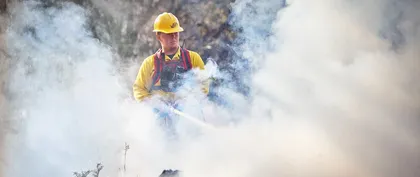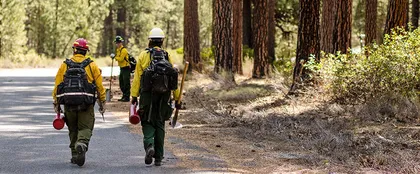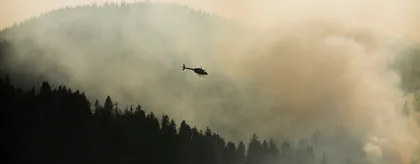About Wildfires
Benefits of Fire
Fire is a natural part of the forest life cycle. It plays a vital role in maintaining certain ecosystems as it helps clear out dead matter into ash, releasing nutrients such as calcium and potassium back into the soil.

Fire Dependency in Nature
Nearly every region in the country has fire-dependent plants or trees that have adapted to withstand natural fires.
Some ecosystems are dependent on fire to reduce the forest canopy and cultivate the forest floor and are slowly transformed if there is not enough natural fire. Sunlight-dependent native plant species are overtaken by those that like shade, and the ecosystem becomes less diverse from undergrowth and littered with dead plant material.
When natural fires burn at intervals appropriate to their ecosystem, they consume leaf litter and other ground vegetation, like dead wood. These fires can facilitate a forest's rebirth, helping to maintain native plant species.

Fire managers can reintroduce fire into fire-dependent ecosystems with prescribed fire. Prescribed fires are carefully planned and led by a team of experts with specific goals and limits.
Prescribed fires are one of the most effective tools to help reduce the risk of catastrophic damage from wildfires on our lands and surrounding communities. They work by:
- Safely reducing excessive amounts of brush, shrubs, and trees
- Encouraging the new growth of native vegetation
- Maintaining the many plant and animal species whose habitats depend on periodic fire

Fire Management Today
Professional fire-management experts, including prescribed fire managers, fire scientists, and fuel specialists, are extremely careful in planning and executing prescribed fires. Based on years of training and experience, they know the optimal conditions and timing for conducting prescribed fires.
Weather conditions, topography, fuel types, and equipment all determine how a prescribed fire is conducted.
After a prescribed fire, fire-dependent vegetation thrives, competition among species is reduced, destructive insect populations and diseases are controlled, and excessive fuel build-up is eliminated.
Learn more about wildfires
Fire is one of nature's most essential agents of change. They’re a powerful natural force we must fully understand, and respect, in order to best help control.